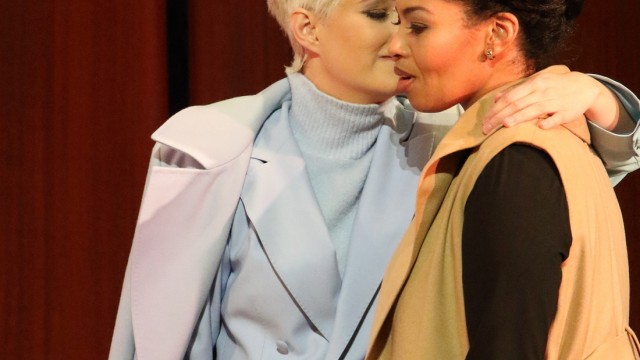A brilliant version of “Freischütz” at the Bavarian State Opera.
Max is a loser, a wannabe Adabei, a cross-stand. Nevertheless, he is lovable, which is why Agathe, the daughter of the economic mogul Kuno, wants to marry him. She also wants it because the humanist Max, who would have refused to do military service earlier, does not fit into her despot dad’s world of money. The employees are celebrating a standing party in its noble business premises (glass front with elegantly curved giant room divider made of wood) without masks, only the service people wear them. There is bottled beer, a type not necessarily valued by connoisseurs as the best of all Munich brewing products. Anyway, anything is possible in Munich, especially in the National Theater, where Carl Maria von Weber’s existentialist experimental piece “Der Freischütz” succeeds as a stirring adventure.
This is by no means a matter of course, because the “Freischütz” regularly fails. Because here broad-minded bourgeoisie, horror romance, naive piety, hunter folklore, wolf gorge, devil magic, jealous drama and lust for murder are mixed together. Weber’s music bounces around unrestrainedly between folk and film music, between impressionism and march cheers, church and pub, pop song and avant-garde. “Der Freischütz” is a hybrid of the special class, a difficult to interpret panopticon that directors and conductors love to elude. It is quite possible that only Ruth Berghaus and Nikolaus Harnoncourt came close to the piece in its ambiguity between everyday harmlessness and psychological hell. But that was a long, long time ago, in 1993 in Zurich.
Don’t you grow up until you’ve committed murder?
At the same level, but absolutely today, the new Munich production by Dmitri Tcherniakov demonstrates why “Der Freischütz” is still unsettling 200 years after its Berlin premiere in June 1821. Tcherniakov, born in Moscow in 1970, is the most subtle opera archaeologist. In the old pieces he always tracks down the fundamental motive that prevents the society shown on stage from functioning properly. But Tcherniakov, which is one of his many strengths, doesn’t claim anything, he just asks the crucial question. In the “Freischütz” he negotiates, well covered by music and libretto, the question of whether our world is based on human sacrifice, as it was in the distant past, whether murder is not the decisive prerequisite for initiation into adult, moneymaker and married life.
So at the Munich business party there is a rifle with a telescopic sight on a tripod. The awkward Max is supposed to randomly shoot a passerby on the street on the instructions of company boss Kuno so that he can make a career and marry the potentate’s daughter. The people in the telescopic sight are shown as enlarged as possible. Pavel Černoch makes his Max hesitate and hesitate. To a person? No, he couldn’t. Černoch’s high, bright, beautiful tenor is capable of despair, and there is plenty of it in these two hours. But this can only be conveyed by singing a tenor, which is why he became the favorite voice of the romanticism who fell in love with desperation. Because Max fails, another shoots, a man on the street has his brain spurting out of the skull.
With this piece in particular, you want strangers to start screaming
How would the audience, which is not allowed to be present, react to this brutal scene? Would it have booed here or only at the end, when the director appeared? How would the people in the hall have reacted to Agathe’s prayer cavatine, which the stunning Golda Schultz sings, disappearing upwards, with longing and despair of death? In these moments one would like to despair of the blessings of the digital and wish that complete strangers around one finally shout their enthusiasm or their indignation or both at the same time quite openly into the hall.
Now Pavel Černoch is unabashedly awkwardly dancing the coarse waltz, which gradually crumbles until only a few pieces of chord remain. Conductor Antonello Manacorda precisely traces the break lines of the score, follows the often abrupt changes in style, conjures up a warm, dark string sound. Oh, hear it live again! Manacorda also shows the sources from which Hector Berlioz and Gustav Mahler and György Ligeti drew their inspiration; he is just as much at home in the mocking as in the grotesque, lost world, in love, and in the military. The many horn passages are fascinatingly balanced on the point between bloodthirstiness and civilization, i.e. exactly at the interface that this piece negotiates. And Manacorda and the musicians combine all of these disparities into a coherent whole. Brilliant.
All in light blue and always slightly blasé, Anna Prohaska floats through the scene as Agathe’s friend Anna. It comes from an outdated future, in love with freedom, which is alien to our brave new world, which yearns so much for security and kowtowing on the old boring values: career, marriage, hierarchy, efficiency, digitization, obedience to the dead , Hierarchy.
Beware, spoilers, the director has another surprise ready in his staging
Prohaska and Tcherniakov show Anna as a lesbian who has built her own life far away from patriarchy, who helps Agathe in a loving and protective way, who is the only one in this piece with a big heart, but also wit and mockery, and who sings everything brilliantly, unsentimentally True, but with the melancholy that Richard Strauss, also a “Freischütz” lover, composed in “Rosenkavalier”.
At Tcherniakov, evil is part of the human being, part of the huntsman Kaspar, he too is thwarted by the company boss who seeks refuge in the spiritual and alcohol. Kyle Ketelsen’s rebellion against the satus quo is as desperate as that of Max. But his Kaspar flees into self-destruction, his voice becoming darker, deeper, paler, ashen.
Time and again, Tcherniakov comes back to the initial question of whether a person only finds entry into society if he kills another person. Max refuses to the last, he fights against the murder demanded of him – until he finally pulls the trigger. But who is the victim? Tcherniakov leaves the end open. As in the libretto, both Agathe and Kaspar fall to the ground. But then the dialectician Tcherniakov strikes the most amazing volte of that evening. If you are interested, you can watch the “Freischütz” free of charge on the website of the Bavarian State Opera.


